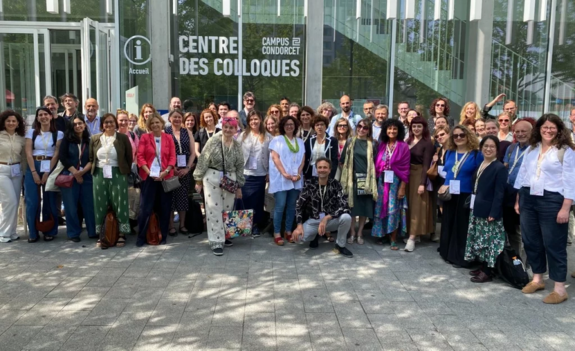The project aimed to develop common curricula and training programmes for education in the fields of Open Science and FAIR data, to connect existing competence centres in the individual countries, and to ensure that the potential offered by EOSC for research is optimally exploited.
The goal was achieved through jointly developed methods, activities, and training resources. We have compiled the most important ones below.
Minimum Viable Skillsets (MVS)
A modular, flexible framework of key skills has been developed for training professionals in a wide range of roles, such as data stewards and policy makers, but also researchers and students, and summarised in a catalogue as Minimum Viable Skillsets (MVS), opens an external URL in a new window. The MVS are intended to serve as a common basis for the development of curricula and training materials, thereby harmonising training in the field of Open Science and FAIR data within Europe.
By defining clear competence requirements for the various Open Science roles, their professional recognition is promoted. The individual skillsets essentially consider how the European Open Science Cloud (EOSC) can be used to support the practice of Open Science.
FAIR-by-design methodology
The FAIR-by-design methodology, opens an external URL in a new window was developed to ensure that the training materials themselves are FAIR. The methodology consists of the steps prepare, discover, design, produce, publish, verify and continuous improvement. The FAIR-by-design microlearning course, opens an external URL in a new window on the Skills4EOSC website provides a quick overview. Although the FAIR-by-design methodology was developed specifically for the materials generated in the project, it can also be used universally and applied to other materials.
Open eLearning courses
Based on the MVS and the FAIR-by-Design methodology, training units on various topics and for different target groups were developed, tested, and made available on the Skills4EOSC eLearning platform, opens an external URL in a new window during the course of the project. Most of the courses were designed as train-the-trainer courses and are a combination of self-study and face-to-face meetings. Participants who have completed all train-the-trainer courses have been awarded the status of Master Trainer and a corresponding Open Badges certification. They are qualified to adapt the courses and offer them in their national, regional, or thematic communities, thereby promoting the expansion of Open Science skills throughout Europe.
In addition to the typical Open Science agendas, courses on special topics, such as the FAIR-by-design methodology mentioned above, are also available. Other courses offer materials specifically designed for use in academic education, such as "Teaching Open Science and Research Data Management to Undergraduates" or "Shaping Open Science Champions" for supervisors of PhD students. In the long term, these courses aim to contribute to harmonising curricula and integrating Open Science fundamentals into academic programmes to build a solid foundation of Open Science knowledge across Europe.
All courses on the eLearning platform will be converted to open-access self-study courses at the end of the project and will be maintained by the GARR consortium and the Competence Centres Network in the future. They will then be available to anyone interested, free of charge.
The Competence Centres Network (CCNet)
The Competence Centres Network was developed to enable a constant exchange between the individual (national) Open Science centres, to accelerate the training of new Open Science professionals, and to make the best possible use of the EOSC, even beyond the project. Therefore, an essential task of CCNet is to maintain and further develop the materials developed in Skills4EOSC.
In the first round, ten institutions were selected as Competence Centre candidates of the network. To support the establishment and successful operation of CCs, a Competence Centre Kit, opens an external URL in a new window with materials, guidelines, and templates was developed. The first General Assembly of the CC Network, opens an external URL in a new window took place on 24 July 2025.
At the local level, the CCs serve as central hubs offering materials, training, and best practice information. In Austria, the official designation of a Competence Centre is currently being discussed in the context of a national EOSC Node.
The role of TU Wien in the project
TU Wien was one of 44 partners in Skills4EOSC. Internal management was handled by the TU Wien Bibliothek and the Center for Research Data Management, with further participation of the research unit of Data Science. In terms of content, TU Wien was particularly involved in the Competence Centres strategy, the development of curricula, and the creation of the data management plan.
Further information
- Skills4EOSc website: https://www.skills4eosc.eu/
- Skills4EOSC eLearning platform: https://learning.skills4eosc.eu/
- Skills4EOSC info flyer: https://www.skills4eosc.eu/resources/publications
- Skills4EOSC materials on Zenodo: https://zenodo.org/communities/skills4eosc/about
Contact
TU Wien
Center for Research Data Management
Favoritenstraße 16 (top floor)
1040 Vienna
